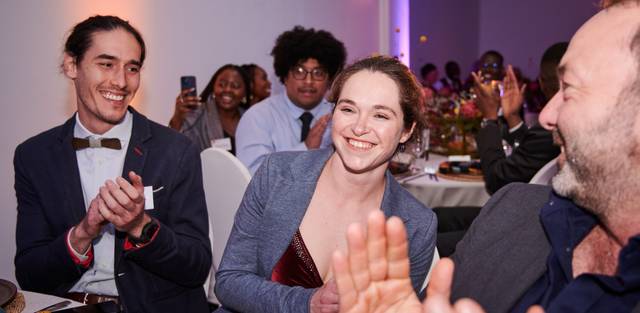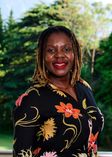
Scholar Stories
A catch-up with Äänit 2023 winner Kira Düsterwald
Kira Düsterwald (South Africa & University of Cape Town, 2017) is a proud recipient of the Äänit Prize 2023.
Kira is a junior doctor, computational neuroscientist PhD candidate and founder of a health tech company on AI-driven health resources optimisation. She is passionate about neuroscience, STEM development, and learning.
We had a conversation with Kira who is based in London doing her PhD at the Gatsby Computational Neuroscience Unit.
First of all, what is ‘computational neuroscience’?
Simply, computational neuroscience is a multidisciplinary field that uses mathematical models and computational techniques to study the brain's structure, function, and dynamics. The aim is to understand how neural systems process information and generate behaviours.
What is the name of your company and what does it do?
Amathambo (which means bones in isiZulu) AI aims to address some of Africa's healthcare challenges by using artificial intelligence to optimise resource allocation in hospitals.
Our initial focus is on automating and improving staff rostering systems, which can reduce wait times, enhance health outcomes, and boost staff satisfaction.
By using machine learning to predict patient loads, they will match staffing levels to demand.
Your innovation won $38 000 in the 2023 Äänit Prize competition. What was the first thing you wanted to do after hearing that you had won?
The first thing I thought about was that we can finally hire people to do the work! I was excited about being able to hire people, but it has been difficult to enact while we are waiting for our main dataset (although we have had full ethics approval for almost a year). However, I am proud to say that we are paying an ad hoc data collector at a hospital in Gauteng, so he is our first personnel expansion!"
What is exciting is having the ability to expand our team to make sure we can offer opportunities for people to enter the health and tech sectors or hire other Africans who are interested in this space. Plus knowing that we have a solid base to make sure that our idea will flourish.
How did you and your team come up with the idea?
I have a background of working in hospitals as a junior doctor in South Africa. I was always assigned to make rosters and I started thinking, “surely there is a better way of doing this?”
On the patient prediction side, I started noticing that there were more patients at certain times like when there was a football match.
There would be more people coming in a couple of hours later, particularly to the trauma units.
But we did not have a systematic way to count and manage the patient influx.
And when I tried to do it on my own, I realised it is more complicated than just an individual looking at numbers and trying to make inferences.
I went to a conference called The Deep Learning in Tunisia two years ago and convinced colleagues in machine learning to help me to solve the same problem of trying to do predictions in hospitals.
Where is Amathambo AI now in the business life cycle?
We are at the proof-of-concept development stage.
We are making smaller consistent steps. It has been a training year, as any new startup will experience.
The Äänit Prize gave us a good platform, and a sense of safety and security, with the knowledge that this idea will happen and will flourish eventually. But we have had lots of other challenges.
Things like administrative legal issues and making sure the company is set up optimally. Most of us are based in the UK, so we have had to navigate around UK restrictions.
There are things going on in the background and so we are making progress with our product invention. We are getting there slowly.
Let us talk about the team behind Amathambo AI. Out of the team of five you are the only Mandela Rhodes Scholar. How did you all meet and how did you ensure your values are aligned?
I met the team serendipitously through talking about medicine in machine learning circles. Despite our different professional backgrounds, we are interested in the same problem. The MRF principles are so embedded from my time as a scholar, that I knew what I needed from other team members, and each of them carries the values of education, reconciliation, entrepreneurship and leadership in their own journeys.
How does one become an innovator?
That is an interesting question. I have always been an analytical person. I enjoy solving problems (usually mathematical) in general, but I never really thought of myself as innovative or being able to do things in an entrepreneurial way.
Esethu Cenga (Äänit Prize winner 2021) was in my cohort in 2017. Seeing her story, and being friends with her, was amazing and I saw what is possible.
How should people approach this process in terms of attachment to an idea? And having the judges and the mentors giving feedback?
Most comments I received during this process were immensely helpful. Feedback must be seen as a way for someone to see your proposal from a different lens, and to think about the feedback more deeply.
Everyone wants you to succeed. Some of the comments given will show you areas where things might not work out.
What does the future look like for Amathambo AI?
We now have this wonderful security thanks to the Äänit Prize, and we can make sure things keep going in the right direction.
Once we have established an initial client base using the rostering tool, and data on the prediction side (which should happen in the next six months) we will be good to go.
What is your personal dream?
The dream for me is to practice and conduct research around paediatric neurology and eventually come back to Africa.







